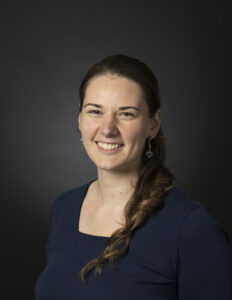Ann G. Dunlea
Woods Hole Oceanographic Institution
2022-2023 Distinguished Lecturer
What controls the long-term trajectory of Earth’s climate and ocean chemistry?
What controls the long-term trajectory of Earth’s climate and ocean chemistry? How do marine sediments regulate – and bear witness to – these changes? Over the past 50 million years, the Earth has cooled from a “Greenhouse” to an “Icehouse” due to a decline in atmospheric carbon dioxide. Yet, the mechanisms that caused the cooling are still contentious. Examining marine sediment drilled during IODP expeditions allows the exploration of the role of the seafloor in modulating global climate, providing unique perspective on this longstanding debate.
In this talk, I will present a hypothesis supported with empirical evidence that invokes changes in reverse weathering on the seafloor to explain the increase in seawater Mg/Ca and global cooling observed over the past 50 million years. This hypothesis inverts prevailing hypotheses and abundant models that require an increase in silicate weathering as the driver of many elemental and isotopic trends over the Cenozoic. Stemming from this work are avenues of research to reconsider the role of the seafloor in biogeochemical and climate enigmas with implications for Earth’s past, present, and future climate.
Ann G. Dunlea completed her PhD at Boston University with Richard W. Murray, researching biogeochemistry and paleoceanography of pelagic clays from the South Pacific Gyre. She became a postdoc at Woods Hole Oceanographic Institution in 2016 and was hired as an Assistant Scientist there in 2019. Dunlea’s research investigates the diverse and dynamic subseafloor geochemical processes actively interacting with the ocean and long-term changes in climate.
LECTURE SCHEDULE
- April 7, 2023 – The University of Texas at Austin, Austin, TX
- April 10, 2023 – Utah State University, Logan, UT
- April 14, 2023 – Kent State University, Kent, OH
- November 3, 2023 – Texas A&M University, College Station, TX







